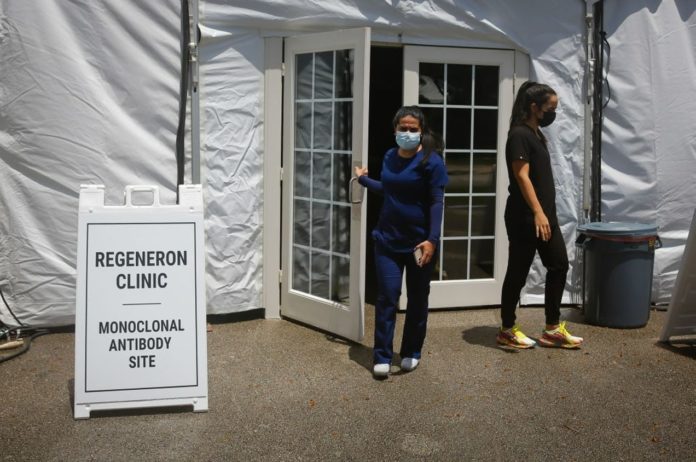U.S. health regulators warned Monday that Covid-19 antibody medicines from Regeneron and Eli Lilly should no longer be used because they don’t work against the omicron strain, which now accounts for nearly all infections in the United States.
The Food and Drug Administration announced that it was revoking emergency approval for both medications, which were purchased by the federal government and given to millions of Americans with Covid-19. The FDA said it could reauthorize the medications’ use if they prove successful against subsequent versions.
Both drugmakers had stated that the infusion medications are less able to target omicron due to its mutations, therefore the regulatory move was expected. Nonetheless, some Republican governors may object to the federal move because they have continued to promote the medications despite the advise of health professionals.
In recent weeks, Omicron’s resistance to two of the most commonly used monoclonal antibody drugs has thrown Covid-19’s treatment plan into disarray.
Alternative medicines, including two new antiviral pills from Pfizer and Merck, are available to treat early Covid-19 infections, although these are in short supply. GlaxoSmithKline’s antibody medicine, which is still effective, is likewise in short supply.
The FDA stated in its assessment that omicron causes more than 99 percent of infections in the United States, making the antibodies “highly unlikely” to help those who are currently seeking treatment. Restricting their use, according to the government, would also minimize unwanted pharmacological side effects such as allergic reactions.
As omicron raced across the country to become the dominant variant, the US government temporarily halted the distribution of the two drugs in late December. However, after objections from Republican governors, including Florida’s Ron DeSantis, who claimed that the drugs were still helping certain omicron patients, officials restarted delivery.
DeSantis has made antibody drugs a centerpiece of his administration’s Covid-19 response, opening up infusion centers and praising them at press appearances while rejecting vaccine mandates and other public-health efforts. Greg Abbott, the governor of Texas, has also opened state-sponsored infusion clinics.
The meds are not a replacement for vaccines and are typically reserved for the most vulnerable, such as the elderly, transplant recipients, and those suffering from heart disease or diabetes.
The US government has supplied enough supplies of the two antibodies to treat approximately 300,000 individuals since early January.
Both Regeneron and Lilly had previously stated that they were working on new anti-omicron antibodies.
The announcement came only days after the FDA approved the use of remdesivir, the first medicine approved for Covid-19, to treat a larger number of patients.
The FDA extended the antiviral’s approval on Friday to cover adults and children with early Covid-19 who are at a high risk of hospitalization. Remdesivir was previously only available to people in hospitals.
A federal expert group had already suggested using the infused drug to avoid hospitalization. Due to their lower effectiveness against omicron, the National Institutes of Health panel advises against continuing to use Lilly and Regeneron’s antibody drugs.
Despite this, many hospitals will find difficulties in implementing remdesivir treatments. Non-hospitalized patients require three days of IV infusions. Many overcrowded hospitals with a lack of staff will be unable to go through that lengthy process.
The FDA announced its decision based on a 560-patient study that found remdesivir reduced hospitalizations by nearly 90 percent when taken within seven days of onset of symptoms. Although the trial predates the omicron variant, remdesivir, like other antivirals, is predicted to maintain its effectiveness against the most recent variant.
Image Credit: Getty
You were reading: FDA: Antibody-drug treatments fail to prevent Omicron COVID-19 symptoms
